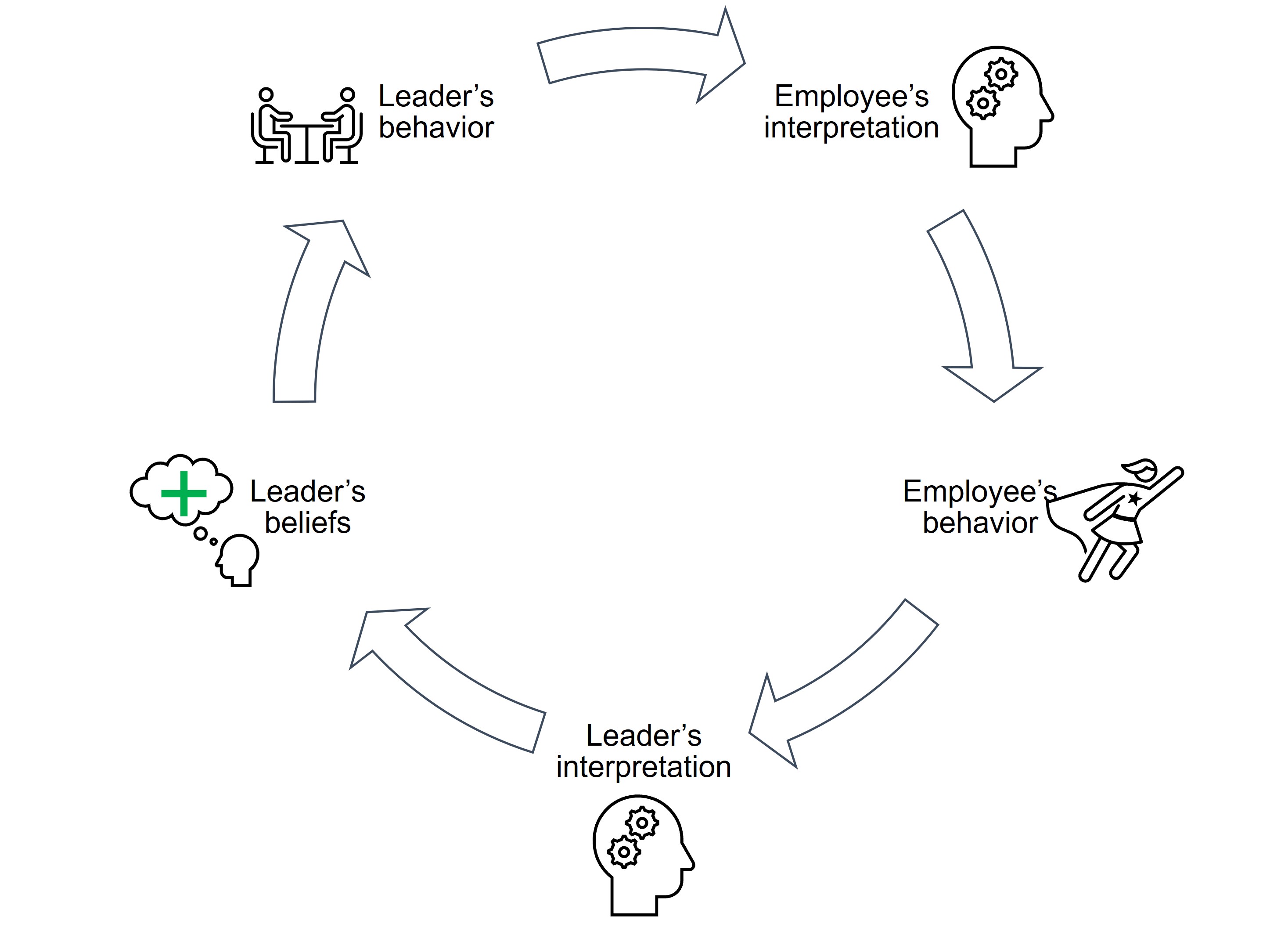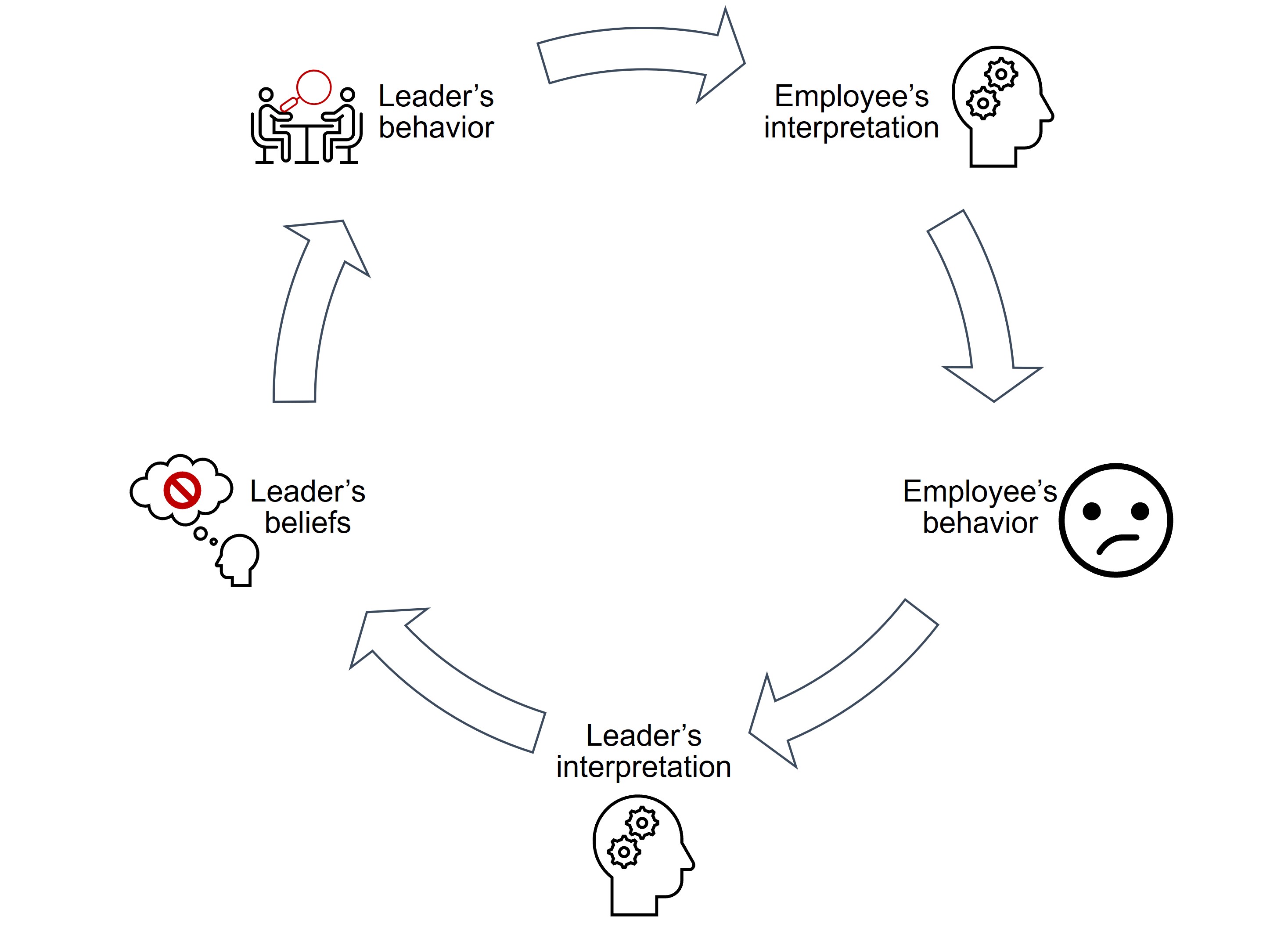
Don’t have time to read the entire post now? Watch this video with the summary.
The shadow of a leader is indeed long and strong. It covers much more than his or her direct reports or people close to them. What the leader thinks of his or her followers predicts their behavior. If a leader thinks that their team has high potential, productivity increases in average 30%. If the opposite occurs – the leader does not think the team has high potential – productivity decreases. The leader can create a vicious or a virtuous cycle.
Performance is the action or process of carrying out or accomplishing an action, task, or function. It happened in the past, so it is measurable. We do not need to decide if we believe in high or low performance or not as there is evidence that will point us one way or the other.
Potential, on the other hand is having or showing the capacity to become or develop into something in the future. Because this happens in the future it is impossible to measure. We can decide to believe if someone has high or low potential as there is no evidence one way or another.
In a virtuous cycle, we think our new direct report, Sam, is a super star. We think good things about them, and we behave in a way that reflects this empowering belief. Sam interprets that and responds to our behavior in a manner that we actually like. They start doing more of the things we like, which makes us think ‘yeah, they’re actually a pretty good performer’. And so, their behavior strengthens our beliefs, we continue to behave in the way we have been doing so far – we praise them, ask questions, etc. This makes them respond by doing more of what we want, and the cycle starts all over again in a continuous positive reinforcement.

In a vicious cycle, we think our new direct report, Alex, is average or even a little below average. We behave in a way that reflects our beliefs – we tend to keep a slightly closer eye on them. We do that because we are trying to help them. Unfortunately, Alex interprets our behavior as believing that we do not think they are very good, or that we are losing faith in them. In other words, they interpret our behavior as, ‘this is a problem’. Alex starts to act defensively, as we all would in those situations. Then we think ‘oh that defensive behavior is further evidence that they are not really that good of a performer. I better keep an even closer eye on them’. Our behavior is eliciting the opposite response from the one we want. So, we keep a closer eye on Alex, who in turn acts more defensively. We then respond by believing they are truly not that good and keeping an even closer eye on them. The cycle starts all over again in a continuous negative reinforcement.

The key to move from a vicious cycle to a virtuous one is to shift our belief – that our entire team has high unrealized potential.
So how do we change our existing limiting belief? By imitating our best micro behaviors.
There is a study done with teachers, where they had to essentially imitate themselves. Teachers videotaped only themselves interacting with students whom they thought had high potential. Then, they videotaped themselves interacting with students whom they thought had low potential, and they compared the videos side by side. The differences in teachers’ behaviors were driven by their belief in student’s potential.
The teachers, then, imitated themselves to act with everyone the way they did with the high potential students by doing very small changes in behaviors. These, however, were perceived by the students as very large shifts. They started to think that the teachers had a different belief in their potential. As a result, the students modified their behavior to that of those with high potential, which made the teachers changed theirs transforming so the vicious cycle into a virtuous one.
What are those micro behaviors?
We can think of them in several categories.
First, how warm are we in the interaction with a perceived high or low potential individual? How much excitement, enthusiasm or interest do we show for what the other person is saying? We would be warmer with Sam, our high potential, than with Alex, our low potential.
Second, what is our level of input or effort? How deep, detailed, or rich are our discussions with Sam, our high potential, and with Alex, our low potential? How many questions do we ask them? What is the quality of those questions?
Third, we want to look at output. How much time do we give Sam and Alex to respond before we chime in? Do we allow them enough space for exploration, to develop their ideas?
Finally, we observe the feedback (verbal and non-verbal) we give to each individual. How much and detailed positive and negative feedback do we provide to Sam and Alex? What is our facial expression, body language, or tone of voice when we are interacting with each of them?
Remember that we are observing micro behaviors. For example, how long it takes us to get distracted by an incoming email, IM, or notification on our phones when we are interacting with Sam or Alex could be quantified in tenths of seconds. Sam and Alex would perceive this tiny difference as a massive one instead, resulting in shifting to or perpetuating a virtuous or vicious cycle.
My own experiment
This week I did an experiment like that of the teachers. I filmed myself interacting with different people in video or phone calls. I noticed that my demeanor was different with each person – my body language, the number and quality of questions I asked, how much time I spent explaining a specific concept, etc.
What drove the difference in my behavior? My thought or perception about the other person’s potential. If I thought they were super stars, I asked thought-provoking questions and provided more space for answers and exploration. I was physically closer to the camera or phone making the interaction feel closer, more trusting and encouraging. I took more notes and was able to reflect what was said (and not said) more accurately.
On the other hand, when I thought the other person was only average, I kept a more neutral body language, did not take many notes, and asked questions but did not invite exploration as much. I also reflected what was said less times.
Then I experimented by applying some of the behaviors I did with the super stars to my conversations with people I perceived as average. I focused on getting closer to the phone or camera, taking time to explain new concepts, and taking more notes to reflect what was said more accurately.
The result was surprising. People showed a side of themselves I did not know existed. They discovered, created awareness, came up with novel solutions, and had a different demeanor, as if they had a spring on their step.
I realized that my perception of them drew out their unrealized potential. We all have high unrealized potential. Great leaders find ways to shift potential from unrealized to realized and accomplish amazing outcomes.
“How far you can go in life is yet to be seen. Don’t let other people’s limited beliefs about what’s possible diminish your potential.” Unknown
One of the main challenges I had with this new concept was on reconciling it with performance. I constantly reminded myself that I am changing my belief about unrealized potential, which is in the future and unmeasurable.
We still set clear expectations and goals and measure people’s performance. We want to shift how we influence people to allow them to realize their potential and show us their greatness so we can accomplish bold, risky goals. People are remarkable and the collective potential is limitless.
What are your thoughts about unrealized potential? What micro behaviors do you express with high or low potential individuals? Please, let us know in the comments. You can write in English, Spanish, Portuguese, or French.
My mission is to help women transition from mid to senior level leadership positions by creating awareness, increasing emotional intelligence, and unveiling the tools and choices available to them, so they can confidently realize and fulfill their potential.
To join our email list and receive helpful articles, humor, and the latest posts, please complete this form with your name and email. In gratitude, we will send you a free e-book on how to become an emotionally intelligent leader.

